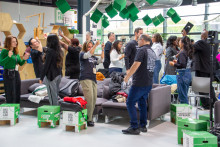Trained as an architect in Turkey, Ekim Tan spent her first years in the Netherlands studying Urban Planning at the TU Delft. The approach she developed in her PhD research eventually became Play the City.
Towards participative design
The company starts by creating a new game tailored to a specific city issue. Clients pose an initial question that concerns the locality, for instance ‘how to get affordable housing for everyone?’ or ‘how should green areas be distributed around the city?’. The team of Play the City then finds all the stakeholders that need to be involved in the discussion, gathers datasets from the field and designs a game that brings the concerning people together to discuss their interests and interdependence.
Tan explained that introducing games as a way to solve issues in city planning is the continuation of a trend towards more participative design. ‘We have the heritage of single-handed planning,’ said Tan. ‘Now, we are learning how to communicate and engage different stakeholders in the process.’
Where are people playing the city?
Tan’s company has designed games for Dutch cities including Amsterdam, Utrecht, and Almere. But they have also developed projects in Dublin, Cape Town, and Istanbul. Played sometimes by a dozen of people, and sometimes by hundreds of them, each game is meant to simplify the communication between different parties. ‘They don’t have to know all the legal terminology, but through the game, they get a sense of the real dynamics,’ explained Tan.
‘A free space to think’
The talk was followed by a discussion with the participants of the Philosophy of the City colloquium. The group reflected on the role of playing in modern society. While games often carry the burden of not being ‘serious’ enough to make big decisions based on them, there seemed to be a consensus that games can bring a new attitude towards building cities.
‘Some clients see the value in our methods but ask “do we need to call it a game?”,’ shared Tan, to which she stressed that posing the exercise as a game is what allows ideas to flow more easily and be exchanged with less apprehension. ‘People need a free space to think. Games bring people together in a way that would never come out otherwise.’







